Scratch 4x Orbital Transport Original Design / Scratch Built
Scratch - 4x Orbital Transport {Scratch}
Contributed by Bob Morstadt
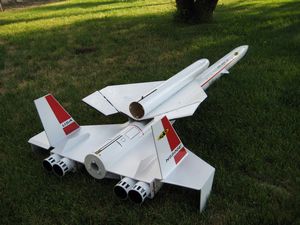
Brief:
After buying a scroll saw to make centering rings, I thought that the 4X upscale Estes Orbital Transport would be an
excellent opportunity to put the scroll saw to extended use. I knew that the 4X scale Estes Orbital Transport was
doable from Jason Ware's website and the article that he wrote for Sport Rocketry March/April 1999.
Construction and Finishing:
From Public Missiles, Ltd:
- QT-3.9" x 48" length
- QT-3.9" x 36" length
- CT-3.9" x 7" length
- Two CR-3.9-1.5 (center rings)
- PNC-3.9"
- MMT-1.5" x 18" length (38 mm motor)
- Piston kit
- About 20' length by ¾" width shock cord strap
From LOC/Precision:
- BT-2.14" x 34" (4 scramjet tubes x 6" length)
- BT-3.00" x 34"
From Roachwerks:
- Custom nose cone
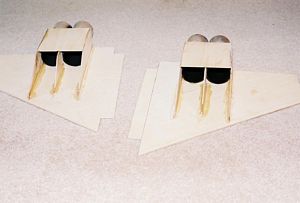 Basically, most booster parts
came from PML and the orbiter airframe came from LOC Precision. Gordon Agnello at Roachwerks did an excellent job
making a custom balsa nose cone for the Orbiter. I bought two. I downloaded the Estes OT plans from the JimZ Rocket
Plans website and enlarged the fin parts by a scale factor of 4 at Kinko's. The large booster wings were cut from 1/8
inch aircraft plywood and had through-the-wall attachment to the motor mount tube. Where possible, lesser load bearing
members were cut from 3/32 inch plywood. I spray painted the scramjet tube interiors flat black prior to gluing them on
the wing. Later, I masked the wings and painted the scramjet intakes flat black, also.
Basically, most booster parts
came from PML and the orbiter airframe came from LOC Precision. Gordon Agnello at Roachwerks did an excellent job
making a custom balsa nose cone for the Orbiter. I bought two. I downloaded the Estes OT plans from the JimZ Rocket
Plans website and enlarged the fin parts by a scale factor of 4 at Kinko's. The large booster wings were cut from 1/8
inch aircraft plywood and had through-the-wall attachment to the motor mount tube. Where possible, lesser load bearing
members were cut from 3/32 inch plywood. I spray painted the scramjet tube interiors flat black prior to gluing them on
the wing. Later, I masked the wings and painted the scramjet intakes flat black, also.
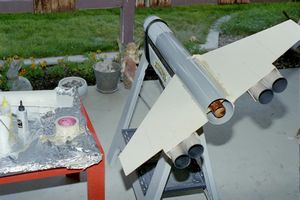 Slots were cut in the Quantum
tube at circumferential locations given by the Estes fin guide. Some care may be needed, because of possible distortion
in the fin guide due to the Xerox scale-up.
Slots were cut in the Quantum
tube at circumferential locations given by the Estes fin guide. Some care may be needed, because of possible distortion
in the fin guide due to the Xerox scale-up.
The original model used Tango Papa decals and the re-build after the first crash, which will be discussed later, used Sticker Shock decals. Both companies make high quality vinyl decals. The spin tabs may have contributed to the orbiter being torn off in the second flight and I am planning to remove them for the third flight. Note that the Orbiter has a slot in the airframe where the tail and internal bulkhead assembly with R/C controls slides in.
I decided to build the orbiter with R/C controls using a concept that I saw on George Gassaway's website putting the servos directly into ½-inch thick Styrofoam. The wings were cut from Styrofoam sheets with a hot wire bought from a local hobby shop along with an electric train transformer. The holes for the servos were cut with a regular X-Acto knife and a hot-blade X-Acto knife bought from Tower Hobbies. The servos were then epoxied into place. The wing leading edges are pre-contoured balsa bought from the local hobby shop and epoxied to the Styrofoam wings. The trailing edges are hobby birch (about ½" x ¼") with slots cut into them to receive the elevon tabs, which are epoxied into place. The forward edge of the elevon is contoured balsa that allows room to pivot. Note the elevon horn epoxied in place behind the balsa. Of course, the wings were attached to each other at the same dihedral angle as the original Estes Orbiter. The wings were then attached to the Orbiter fuselage. I used white Monokote to cover the wings on top and black Monokote to cover the wings on the bottom.
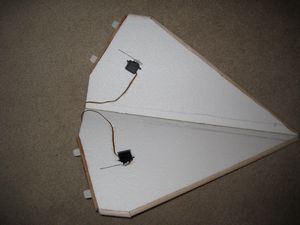
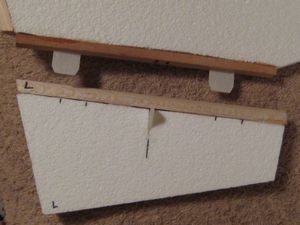
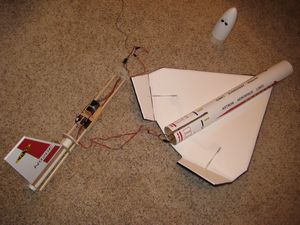 The tail internal assembly
with bulkheads, booms or rails ( ½" x ¼" hobby birch) , the R/C receiver, and batteries. There are
some short rails glued to the internal fuselage and some holes cut into the bulkheads that guide the assembly when it
is slid into place. There are no aft screws to attach the rear of the assembly. Rather, there is an internal screw that
attaches the assembly to a permanent bulkhead in the front. The receiver and batteries are on a sled that can be moved
on the rectangular rails to find the right location for a good glide. The tail is attached to a 29mm (ID) tube that
could hold a future motor or possibly an electric prop.
The tail internal assembly
with bulkheads, booms or rails ( ½" x ¼" hobby birch) , the R/C receiver, and batteries. There are
some short rails glued to the internal fuselage and some holes cut into the bulkheads that guide the assembly when it
is slid into place. There are no aft screws to attach the rear of the assembly. Rather, there is an internal screw that
attaches the assembly to a permanent bulkhead in the front. The receiver and batteries are on a sled that can be moved
on the rectangular rails to find the right location for a good glide. The tail is attached to a 29mm (ID) tube that
could hold a future motor or possibly an electric prop.
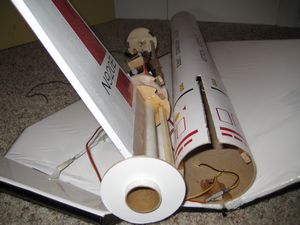
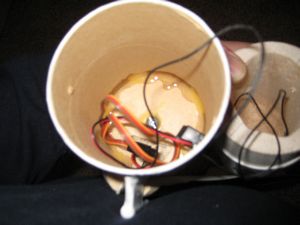
The Orbiter's tail fin is constructed from ¼" balsa wood with 1/64" birch plywood glued on both sides with wood glue. The final structure is strong, light, and easy to build. Several of the Orbiter's internal bulkheads are built the same way.
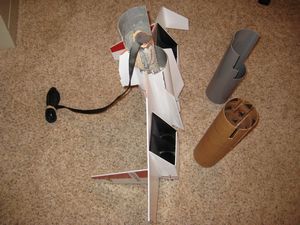 The booster used a ten-foot
diameter parachute from Top Flight. This is an excellent chute for landing on the hard Bonneville Salt Flats, but the
chute failed to come all the way out of the airframe on the first flight. Most of the serious damage was confined to
the nose cone and airframe ahead of the fins. I had to scrape out urethane foam that was used in the original
construction in order to fit in the PML coupler tube. Also slots were cut in the PML coupler in order to allow passage
around the through-the-wall fins. With the coupler tube in place I traced the outline of the old fuselage onto tracing
paper and sent the trace to PML. For a small fee PML cut the Quantum tube section. When this assembly was put together,
it provided an excellent attachment point to receive the rest of the new airframe. Most of the major repairs were made
with Aeropoxy ES6209 adhesive.
The booster used a ten-foot
diameter parachute from Top Flight. This is an excellent chute for landing on the hard Bonneville Salt Flats, but the
chute failed to come all the way out of the airframe on the first flight. Most of the serious damage was confined to
the nose cone and airframe ahead of the fins. I had to scrape out urethane foam that was used in the original
construction in order to fit in the PML coupler tube. Also slots were cut in the PML coupler in order to allow passage
around the through-the-wall fins. With the coupler tube in place I traced the outline of the old fuselage onto tracing
paper and sent the trace to PML. For a small fee PML cut the Quantum tube section. When this assembly was put together,
it provided an excellent attachment point to receive the rest of the new airframe. Most of the major repairs were made
with Aeropoxy ES6209 adhesive.
The first flight used a Nomex shield ahead of the chute. On the second flight I used the standard PML piston with a 14.5' length of ¾" width shock cord to the piston plus 2.5' after the piston to the nose cone. A backyard test with 2.75g of BP showed that the piston will clear the parachute from the airframe quite nicely. I used a small section of cardboard tube that fit tightly around the powder well of the 38mm AeroTech reloadable motor to hold the charge.
The weight of the total glider is about 1.68 pounds. With an Aerotech I284-M (10 second delay) reload, the total weight of booster and glider together is 12.5 pounds. Using a drag coefficient Cd = 1.30 the altitude predictor on the Mark Sullivan website gives an altitude of 980 feet and an apogee at about 8 seconds.
Flight and Recovery:
On the first flight the ejection charge blew past the Nomex flame shield and the ten-foot diameter parachute only
came part way out of the airframe. The booster had a very hard impact, but with a lot of hard work it was restored to
fly a year later. The orbiter did separate on parachute ejection successfully. Being preoccupied with the impending
booster crash and looking straight into the sun, I put the Orbiter elevons in the far up position. Since the Orbiter
had no forward velocity, it fell like a pancake but was totally undamaged.
For the second flight I installed a PML piston. A backyard test with 2.75g of BP showed that this combination would work fine and in fact it did on the second flight. The only booster damage after a gentle landing was two loose T-nuts on the motor retaining system. However, a small part of the Orbiter right wing was torn off shortly after take-off several hundred feet up. The Orbiter was pinned to the booster at 3 locations. These attachment points consist of a forward pylon with a 3/16" diameter dowel that slides into a small tube on the booster and two small tubes that are attached to the under side of the Orbiter wings and slide into dowels on the booster spacecraft supports. These tubes were attached to the Styrofoam wings with small patches of 1/64" birch plywood epoxied to the wings. The forward pylon was only epoxied to the cardboard airframe and was torn off. The left wing attachment tube was torn off. Photographs indicate that the wing failure occurred first. For reconstruction, the forward pylon needs to be stronger and the wings and attachment points strengthened. The booster spin tabs need to be removed.
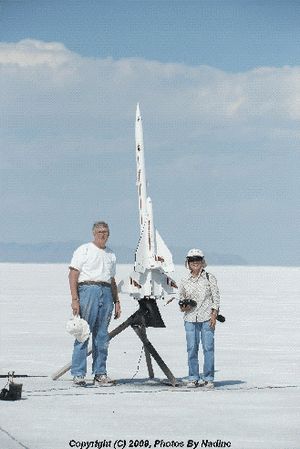
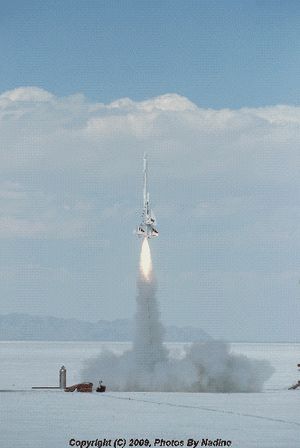
 |
 |